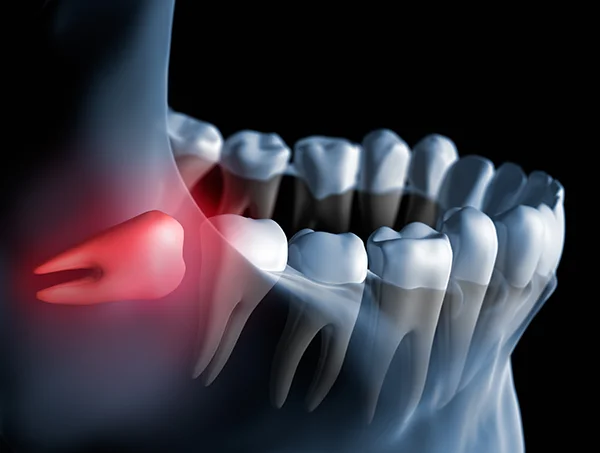 Third molars, commonly known as wisdom teeth, emerge in late adolescence or early adulthood and often necessitate removal due to various dental issues. Despite the prevalence of this procedure, many individuals experience apprehension about it. Understanding the reasons behind wisdom teeth removal and the routine nature of the process can alleviate concerns and enable informed decision-making.
Third molars, commonly known as wisdom teeth, emerge in late adolescence or early adulthood and often necessitate removal due to various dental issues. Despite the prevalence of this procedure, many individuals experience apprehension about it. Understanding the reasons behind wisdom teeth removal and the routine nature of the process can alleviate concerns and enable informed decision-making.At Rolling Plains Dentistry, we specialize in preserving the health and beauty of your smile. Our services include wisdom teeth removal, provided with utmost care and expertise, ensuring a comfortable experience and optimal outcomes for patients.
Reasons for Wisdom Teeth Removal
Wisdom teeth frequently encounter problems due to their late eruption and limited space within the jaw. Impaction is a common issue, as these molars may grow at odd angles, exerting pressure on adjacent teeth and causing misalignment or overcrowding. Additionally, their positioning often hinders proper cleaning, increasing the risk of cavities and gum disease.
In addition to crowding, impacted wisdom teeth can directly harm adjacent teeth, potentially damaging their roots or causing structural shifts. Furthermore, the development of cysts around impacted wisdom teeth poses a serious threat, as these fluid-filled sacs can erode surrounding bone tissue and compromise overall dental health.
Timing for Wisdom Teeth Removal
The ideal time for wisdom teeth removal typically falls in late teens to early twenties when the roots are not fully formed, easing extraction and minimizing complications. Even without immediate symptoms, preemptive removal is often recommended to prevent future issues such as impaction or damage to adjacent teeth.
Symptom-based considerations, including pain, swelling, or jaw stiffness, may also indicate the need for wisdom teeth removal. Addressing these indicators promptly can alleviate discomfort and prevent further complications.
Understanding the Wisdom Teeth Removal Procedure
Familiarity with the wisdom teeth removal procedure can ease anxiety and prepare patients for a smoother experience. Discussions about sedation options, understanding the surgical process, and adherence to post-operative care instructions, empower patients to confidently navigate wisdom teeth removal and achieve optimal oral health.
Pre-Procedure Consultation
During this appointment, the patient's medical history and procedure specifics may be discussed. X-rays may be taken to assess wisdom teeth position and alignment, identifying potential complications like impaction or nerve proximity. Patients are encouraged to ask questions and address concerns about the procedure or post-operative care.
Anesthesia Options
Wisdom teeth removal can be performed using various anesthesia types to ensure patient comfort. Local anesthesia commonly numbs the extraction area, eliminating pain during surgery. Sedation options such as nitrous oxide, oral sedatives, or IV sedation may be recommended, considering factors like extraction complexity, medical history, and anxiety levels.
Surgical Extraction
The procedure starts with anesthesia administration for patient comfort. Following anesthesia, an incision is made in the gum tissue to access the wisdom tooth, possibly involving bone removal to cover the tooth. Specialized instruments are used to carefully extract the tooth, sometimes involving sectioning for easier removal. After extraction, the surgical site is cleaned and stitched to promote healing.
Post-Operative Care
After wisdom teeth removal, patients receive post-operative care instructions to aid recovery and minimize discomfort. Guidelines for pain and swelling management, such as applying ice packs and taking prescribed medications, are provided. Patients are advised to consume soft foods and avoid strenuous activities initially. Proper oral hygiene practices, like gentle rinsing and avoiding straws, are crucial for preventing infection and promoting healing.
Recovery and Aftercare
Immediate post-operative care includes managing bleeding, using gauze packs, and administering pain medication as needed. A soft food diet in the initial days post-surgery aids in minimizing discomfort and promoting healing. Strategies for swelling and pain management, such as ice packs and medication usage, are outlined. Patients receive guidance on gentle rinsing and timing for resuming regular brushing to maintain oral hygiene.
Wisdom Tooth Removal at Rolling Plains Family Dentistry
Wisdom teeth removal is a routine procedure offering significant long-term oral health benefits. By addressing potential issues early and prioritizing preventive care, individuals can preserve their smiles and enjoy lasting dental well-being. For personalized guidance and expert care, scheduling a consultation with Rolling Plains Dentistry is recommended. Contact us today at 940-663-5353!


